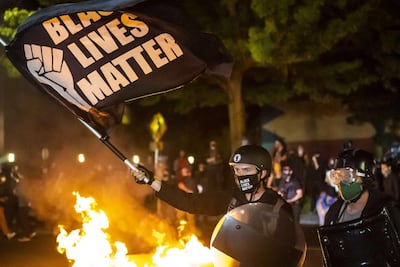Race relations can be a fraught subject anywhere but especially so in the US right now. The long hot summer of national reckoning on race and policing has slipped into an autumn of continuing anguish and defiance.
Americans' view of the relations between black and white races is now the most negative of any year since Gallup started asking the question in 2001. And the issue of racial injustice has become one of the top four concerns, according to an NPR/Ipsos poll, as Americans prepare to vote in a consequential presidential election that will be closely watched around the world.
It figures. Nearly 60 years after Martin Luther King delivered his “I have a dream” speech to an audience of a quarter of a million people in Washington, DC, the issue of race relations in America can be boiled down to three intensely symbolic, highly charged things: knees, guns and votes.
Knees feature prominently. Late last month, tens of thousands joined the Get Your Knee Off Our Necks march in Washington, so named because of the manner in which George Floyd, an unarmed black man in Minneapolis, died at the hands of police in May.
A policeman knelt on Floyd’s neck as he gasped “I can’t breathe”. A bystander’s cellphone video of the atrocity went viral. The march followed repeated instances of the world and its sportsmen kneeling in support of racial and social justice campaigners in America.
And US President Donald Trump, who has called anti-racism activists "domestic terror", launched an ad attacking his Democratic challenger, Joe Biden, for "taking a knee" while racial justice protests in Minneapolis turned violent. The unsubtle message is that Mr Biden is complicit in the rioting that has occasionally erupted during the protests. It is the same subtext as Mr Trump's Republican National Convention last month, which focused on characterising the Democrats as the party of chaos and anarchy.
Guns too are increasingly coming into play as armed right-wing militia and vigilante groups supporting Mr Trump directly confront anti-racism protesters on the streets of American cities such as Kenosha, Wisconsin, Portland, Oregon and, more recently, Louisville, Kentucky. Sometimes the racial justice protesters are also visibly armed, raising the prospect of dangerous confrontations across a nation on edge.
Finally, there are the votes. With less than two months to go to the election, there are growing fears of vote suppression, especially in the case of poorer black voters and those who prefer to cast their ballot by mail because of the pandemic.
The situation remains volatile as Labour Day, marked in the US on the first Monday in September, came and went. Labour Day is traditionally seen to kick off the last lap of the general election campaign, which means both the Trump and Biden teams are intensifying their efforts to dominate the narrative, win over new voters or sway wavering ones.

The most recent estimates show Mr Trump trailing in national opinion polls as well as in Wisconsin and Michigan, two of the three key swing states. He is currently tied with Mr Biden in Pennsylvania. An incumbent American president has never got past Labour Day as such a clear underdog since George H W Bush in 1992.
Analysts say Mr Trump has a narrow path to re-election and that it runs through heavily white states like Wisconsin and Minnesota. Unsurprisingly then, Mr Trump has put himself at the centre of the raging national debate about race and police tactics, but only by dismissing suggestions of "systemic racism" and assuming the mantle of guarantor of law and order.
Mr Trump recently tweeted mockingly about a Black Lives Matter activist and hailed his administration’s controversial new move to cut off federal agencies' anti-racism training, which has been cast by the government as "divisive, anti-American propaganda". He also continues to deride calls for policing reforms and to describe the unquiet status quo as the “American way of life”. This is thought to be code for white dominance of the levers of power.
So, what might happen next? The logic and demands of politics in a presidential election year would seem to be heading for a full-frontal collision with a passionate, once-in-a-generation call for wholesale change. The disparate protests for social justice across the country show no sign of petering out, with Portland hitting the 100th-day mark of continuous demonstrations at the weekend.
Meanwhile, new cases of alleged police mistreatment of black people and brutality towards them continue to emerge, further fuelling sorrow and rage on the part of protesters. The case of Daniel Prude, a black man who suffocated in March while being handled by police came to public attention just last week. Prude was placed in a restraint called a "spit hood" by police.
The only certainty right now is that tension on America’s streets will continue to escalate. What is not clear is the extent to which Mr Trump’s “law and order” message will resonate in the countdown to election day, November 3, as Americans increasingly express alarm about protests and counter protests in their neighbourhoods and cities.
Perhaps the best way to think about the future of the US is to disentangle the facts from popular perception. The facts tell a compelling story.
Despite its shortcomings, America in 2020 is nothing like the 1950s, when the equality of man envisioned by the Declaration of Independence was very far from reality, inter-racial marriage was illegal in many states and housing and education were segregated. And then there was Barack Obama's election – and re-election – to the highest office in the land. It wasn't so much a sign that America had achieved a post-racial society but that it was striving towards it.
The US has been a country in social transition for much of the past half-century. For some, the pace is imprudent and all too hasty. But despite everything, there is nothing yet to suggest these naysayers will ultimately prevail.
Rashmee Roshan Lall is a columnist for The National





















